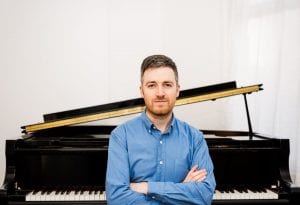The third in our series of interviews with visiting instrumental and vocal teachers at City features pianist Richard Uttley.
Many thanks for joining us, Richard. Could you start by telling our students something about your current performance projects?
One unusual project I’m particularly enjoying at the moment is playing Erik Satie’s ‘Entr’acte’ music from his ballet Relâche, which was written to accompany a silent film by René Clair. I’m playing it in the piano duet version with my friend and collaborator Kate Whitley, and we’re performing it live with the film. We spent a long time experimenting to work out how we could bring out as much subtle detail in the timing between the music and visuals as possible; it was a labour of love but that makes it so enjoyable for us to share the result with audiences. As well as being a pianist, Kate is also a composer and she’s writing me a piece that I’ll premiere in a recital at City this spring. Other things I’ve got on the go this season include the Gershwin Piano Concerto, which I learnt over summer and played in the Queen Elizabeth Hall recently, and a cycle of all ten Beethoven sonatas for piano and violin for a tour in Scotland next month.
What is the most exciting country you’ve played in? I’ve toured in China several times in recent years, and have given recitals in over twenty cities there. I didn’t get to spend a long time in any of them, but to play and travel in a totally different culture was a great experience and one I feel very lucky to have had through music.
What is the most memorable concert or other musical event that you have attended? It was a concert at LSO St Luke’s (just round the corner from City, in fact) that was part of a Barbican festival in 2007 focussed on the music of Thomas Adès. I wasn’t living in London at the time but made a special trip to attend this concert as I was obsessed with Adès’s music back then. The concert included, amongst other things, the composer himself playing his mesmerising Traced Overhead (I had no idea until then what an incredible pianist as well as composer Adès is), and a very starry Les Noces, with Peter Donohoe, Rolf Hind and Katia and Marielle Labèque on the four pianos and an amazing group of Russian singers called the Pokrovsky Ensemble. If I could go back in time to hear concerts again I’d go to that one every week!
What is the highlight of your music teaching career so far? I started teaching when I moved to London in 2008 and I still have one of my very first pupils, who was a complete beginner when I began working with him. He’s still young but now an excellent pianist and fine musician with genuine curiosity for music of many kinds. Not a highlight in the sense of a one-off event, but I consider this a real achievement.
What was the most important thing you learnt from your own teachers? How to control sound at the piano, and why that’s so important.
If you could give one piece of advice to music students, what would it be? Listen to lots of music, and go to concerts. I learnt a huge amount from going to as much as I could while I was a student (and still do in fact), and even from page turning for other pianists! I think there was a time, in generations gone by, when everyone knew a lot of classical music simply because it was what was played at home and was talked about with knowledge and enthusiasm by many people. Unfortunately, today it’s much more likely that you’re going to have to find out about these things for yourself. The same rewards are there at the end of course, but you’ll probably have to be more proactive to find them.
What was the best thing about your own course when you were a student? Individual teachers that I encountered. My analysis tutor was a PhD student at the time and I was so inspired by the way he thought about music and discussed it with us. When I got the opportunity to make my first recording I asked him to write me a piece – it was based on dance music and all my friends loved it, so it became a proper party piece for me. His name is Chris Willis and he recently scored Armando Iannucci’s film The Death of Stalin; the score’s all pastiche of 1950s music from the Soviet Union and has been winning worldwide acclaim so I’m quite chuffed to have spotted Chris’s genius early on!
What would you most recommend students do beyond practising their instrument/voice and rehearsing? Make the most of being in London. If you come to study at City you’ll be in the heart of an incredibly vibrant city, with world class food, theatre, concerts, museums and galleries – to name but a few things – and this is a great opportunity to have experiences that will stay with you for a lifetime. Students get cheap tickets too!
Thank you!
https://soundcloud.com/richard_uttley/chris-willis-burning-up
Richard will be performing at City at the end of April
https://www.city.ac.uk/events/2019/april/richard-uttley

